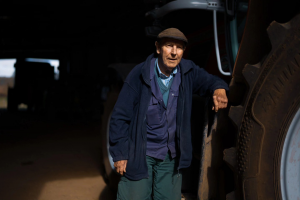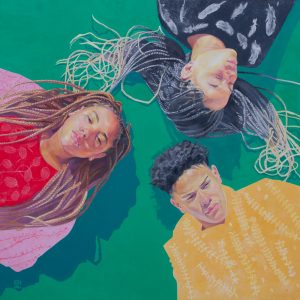Marcun Doran
CBT Therapist & Integrative Counsellor
Working at the intersection of evidence-based therapy and emotional intuition, Marcun’s practice on Ireland’s North Coast invites clients to find healing through conversation, community, and connections.

When she first arrived on the North Coast of Ireland for her university interview, Marcun drove up from Larne and was immediately captivated. “I just could not believe it,” she recalls. “Absolutely stunning. And the accessibility – you’re down on the beach or the rocks in five minutes.”
That visceral connection to place would become central not just to her life, but to her work. Now a practicing CBT therapist and integrative counsellor, Marcun brings together clinical expertise and intuitive empathy to help clients across Northern Ireland, and beyond, find healing.
More Than One Approach
“It’s a long title, but I usually introduce myself as a CBT therapist and integrative counsellor,” Marcun says. “I’m qualified as both.” Her dual training allows her to draw from multiple methods: CBT, person-centred, and psychodynamic. “Integrative in a basic sense means that you can choose the tools and techniques that you believe are going to be helpful.”
While CBT offers structure and practical goals, Marcun is mindful of its limitations. “Sometimes the delivery can be a little bit cold, a little bit harsh,” she admits. Her background in integrative counselling was partly motivated by a desire for more emotionally nuanced work.
She describes a typical process: “Different people suit different approaches. Some need space to talk. Others want to get to the crux of it immediately.” She blends styles according to client needs. “CBT is about focusing on the problem now, in the present. Person-centred is more about processing emotion, with empathic reflective responses. And psychodynamic brings in the ideas of Freud, working on identifying defence mechanisms for example.”
A Therapist’s Journey
Marcun’s route into counselling was shaped early on. “I always liked real conversations,” she says. “Not small talk. I mean, I can do small talk, but if it goes on too long, it can be tiring.”
After studying at Ulster University, she worked for a consultancy firm in Bristol, commuting back and forth before eventually settling permanently in Northern Ireland. “I always loved hearing about people’s lives. I’ve always liked helping relieve people’s suffering.”
Her experience spans GP surgeries, NHS referrals, the charity and voluntary sector, and working with victims and survivors, alcohol dependence, disadvantaged youth, and more. In 2018, she established her private practice. “I wanted to bring something helpful to my local community.”
The arrival of COVID-19 and the shift to online sessions opened new possibilities. “I now see clients from all over – the UK, Ireland and Europe.”
The Power of Place
The North Coast isn’t just a backdrop for therapy – it’s part of the process. “From a CBT perspective, the way you make meaning out of your environment significantly affects your feelings,” Marcun explains. A peaceful landscape can evoke calm. A traumatic association can trigger anxiety.
Avoidance, she cautions, only reinforces negative emotions. “If you had a bad fall somewhere, going back there might make you anxious. But avoiding it strengthens that fear.”
There’s also something inherently healing about the coastline itself. “You can be alone on a beach here quite easily. It gives you a sense of perspective – like, we’re just small creatures in a big world.” For Marcun, places like Portballintrae’s Runkerry Strand, and Portstewart are more than scenic, they’re therapeutic.
“Nature promotes feeling good,” she says. “Cities, on the other hand, can almost lead to isolation and loss of connection. Often empathy can feel absent in cities. People live alone in apartments, rushing around. It’s a less mindful existence.”

On Empathy and the Digital Age
Despite her deep respect for nature and human connection, Marcun embraces change. “Therapy is going digital – AI, online platforms, mental health apps. And that’s fine. Different mediums work for different people. But there’s nothing quite like a real human relationship.”
She points to therapy research that highlights the importance of the therapeutic relationship. “Thirty percent of outcomes are due to to the theerapeutic relationship,” she says. “That’s huge.”
Empathy is at the heart of it. Referencing motivational interviewing pioneers Miller and Rollnick, she recalls their studies showing that therapists with the best outcomes were those with the most empathy. “You can develop empathy,” she says. “If we can teach it to kids, we can teach it to adults.”
Culture, Community and Care
Marcun has noticed the differences between her Yorkshire upbringing and the culture of Northern Ireland. “I have found people here to be more careful with each other’s feelings. It’s a more tender way of communicating.”
She highlights how important family is in Northern Irish culture: “People spend time with their families. They live near each other. There’s respect, a strong sense of community.”
One powerful example of this deep-rooted sense of community comes from an early experience Marcun recalls after moving to Ireland: “I was driving down the street and there was a businessman in full business gear, and he was talking to a man who quite clearly looked homeless, you know, and they were laughing and getting on.”
The scene struck her for its simplicity and warmth – cutting through social divisions and revealing a culture where human connection comes first. Her reflection highlights how Irish values of empathy, respect, and genuine connection extend beyond private life, quietly shaping the tone of everyday public encounters.
This cultural closeness, she believes, supports mental health.
“Small communities keep each other in check. Some people say they wish they were more anonymous, but in the long run, that accountability is a good thing.”
Folklore and Evidence
As a CBT therapist, Marcun works within a scientific, evidence-based model. But that doesn’t mean she dismisses the folklore and spiritual traditions of Irish culture.
“You have to be respectful of people’s beliefs,” she says. “As long as they’re not harmful, you can still work with them.”
She’s had clients with spiritual or magical thinking, and she adapts accordingly. “You can still use Socratic questioning. You’re just trying to find the line between what’s supportive and what might be unhealthy.”
A Human Connection
At the heart of Marcun’s work is the desire to connect. “I don’t want clients to feel they have to be accountable to me,” she says. It’s not about ticking boxes. If someone didn’t do the exposure work we planned, the question isn’t ‘Why didn’t you?’ It’s ‘How can we make it easier for you?’”
She reflects on how therapy is evolving. “When I did my CBT training, I felt the empathic element was missing. I hope that’s changing.”
And despite all the tools and techniques, she still believes the most powerful moment in therapy is when a client uncovers something for themselves. “Even if I think I know what’s going on, it’s better if they come to it on their own with my support.”
Find out more about Marcun and the support she provides on her website: vitalitycbt.com
The Latest Articles

Inni-K on Still A Day: Genuine Irish Songwriting
In the aftermath of touring Still A Day, the singer, composer, and multi-instrumentalist considers music, nature, and what remains once the movement stops.

Bob Speers and the Quiet Magic of Ireland’s Bogs
In a room filled with timber, peat, and light, artworks hung on walls are more like fragments of the land itself – weathered, breathing, and alive with memory.

Hernan Farias on Light, Connection and Creative Growth
From the Classroom to the Camera – charting his shift from teaching English in Chile to full-time photography in Northern Ireland.

The Colour & Spirit of Time: Tricia Kelly’s Journey with Ócar
Exploring how sixty million years of volcanic fire, weather, and transformation created the red ochre that now colours Tricia’s life and work.

Faith and Colour: The Genuine Art of Beverley Healy
In her imaginative work, paint becomes prayer – a meditation on trust, surrender, and creation, where colour and stillness meet to form something transcendent.

Ruairi Mooney on Creativity, Practice & the Search for Authentic Art
From the North Coast to the Canvas: a journey of resilience, daily practice, and the slow discovery of an authentic artistic voice.
